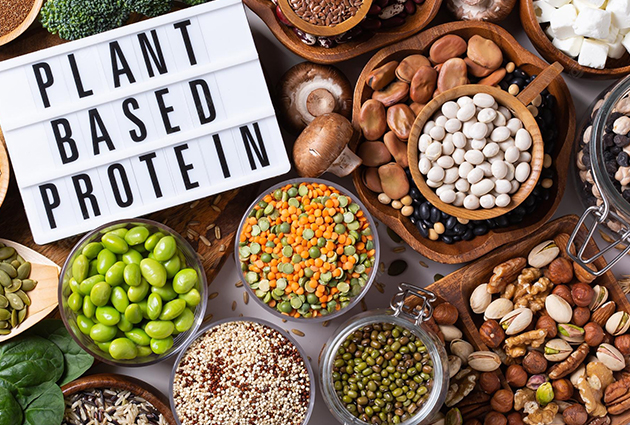Introduction to Vegan Protein, Plant-Based Protein, and Vegan Diet
Embarking on a vegan
diet? Or maybe you're just trying to incorporate more plant-based protein into
your meals? Either way, you've come to the right place. This comprehensive
guide covers all aspects of vegan protein, plant-based protein, and the vegan diet.
You'll leave armed with information that will empower you to make healthier,
more sustainable choices.
The Basics of Vegan Protein
Understanding Amino Acids
Protein isn't just
protein. It's made up of amino acids, the building blocks of life. While
animal-based proteins are generally considered "complete" because
they contain all essential amino acids, most plant-based proteins are
"incomplete." But don't let that term mislead you. By eating a
variety of plant-based foods, you can still get all the essential amino acids
you need.
Sources of Vegan Protein
When it comes to vegan
protein, options abound. Some popular choices include tofu, tempeh, legumes,
and whole grains like quinoa and bulgur. By incorporating these into your daily
meals, you can meet your protein needs without ever touching meat.
Vegan Protein vs. Animal Protein
Environmental Benefits
Adopting a plant-based
protein regimen not only benefits your health but also positively impacts the
environment. Animal agriculture contributes significantly to greenhouse gas
emissions, water consumption, and deforestation. On the other hand, plant-based
proteins have a much lower environmental footprint.
Nutritional Comparisons
At the nutritional
level, plant-based proteins often come with additional benefits like fiber,
antioxidants, and various vitamins and minerals. Animal proteins may offer more
protein per serving, but they can also be high in saturated fats and
cholesterol.
The Science Behind Plant-Based Protein
Digestibility
One concern around
plant-based proteins is digestibility. Plant-based proteins tend to be less
digestible than their animal-based counterparts. However, cooking, fermenting,
or sprouting plant foods can significantly improve their digestibility.
Bioavailability
Bioavailability
measures how efficiently your body can use the nutrients from food. While
animal-based proteins tend to have higher bioavailability, many plant-based
options like soy and legumes are also excellent sources.
Superfoods: Protein-Packed Vegan Options
Quinoa
Quinoa isn't just a
trendy grain; it's a complete protein, making it a unique plant-based option.
One cup of cooked quinoa contains about 8 grams of protein.
Lentils
Another protein
superstar, lentils pack around 18 grams of protein per cup. They are also rich
in essential nutrients like iron, making them an excellent choice for a
balanced vegan diet.
Plant-Based Protein Supplements
Pea Protein
Pea protein has gained
immense popularity in recent years. It's not only an excellent source of protein
but also rich in essential amino acids like branched-chain amino acids (BCAAs),
which are vital for muscle growth and repair.
Hemp Protein
Hemp protein is
another alternative, known for its balanced ratio of omega-3 and omega-6 fatty
acids, in addition to its protein content. It's also easier to digest compared
to other plant-based proteins.
Vegan Diet: More Than Just Protein
Nutritional Balance in a Vegan Diet
A vegan diet isn't
just about replacing animal-based proteins with plant-based ones. It's about
overall nutritional balance, which includes vitamins, minerals, and other
essential nutrients.
Misconceptions and Myths
A prevalent myth is
that it's hard to get enough protein on a vegan diet. This guide should already
have debunked that. With the right choices, you can meet or even exceed your
protein needs easily.
Vegan Diet for Athletes
Increased Recovery
Many athletes are
turning to vegan diets for quicker recovery times. Plant-based foods are rich
in antioxidants, which can help reduce inflammation and speed up recovery.
Sustained Energy
Unlike diets high in
processed foods and sugars, a balanced vegan diet can provide sustained energy
throughout the day, making it ideal for athletes.
Societal Impacts of a Vegan Diet
Community Benefits
Veganism isn't just a
diet; it's a lifestyle choice that can foster community bonding. More people
adopting vegan diets means more demand for vegan products, thus increasing
availability and affordability for everyone.
Economic Effects
The growing popularity
of plant-based diets could have a profound economic impact. As more consumers
demand vegan options, new markets open up, providing opportunities for
innovation and job creation.
FAQs
What is a complete protein in the context of a vegan diet?
A complete protein contains all nine essential amino acids. While most plant-based proteins are incomplete, some like quinoa and soy are exceptions.
Is a vegan diet expensive?
It can be, but it doesn't have to be. Lentils, chickpeas, and other legumes are often cheaper than meat and are excellent protein sources.
What are the best vegan protein supplements?
Pea, rice, and hemp proteins are among the most popular and effective plant-based protein supplements.
Can I build muscle on a vegan diet?
Absolutely. With the right combination of plant-based proteins and a well-balanced diet, building muscle is entirely possible.
Is a vegan diet healthy for kids and pregnant women?
Yes, but it requires careful planning to ensure all nutritional needs are met, including protein, iron, calcium, and vitamin B12.
Are there any drawbacks to a vegan diet?
Some people might experience nutrient deficiencies if their vegan diet isn't well-planned. Consulting a healthcare provider for a balanced diet plan is advisable.
Conclusion
Vegan Protein,
Plant-Based Protein, and Vegan Diet offer a plethora of benefits ranging from
health advantages to positive environmental and societal impacts. It's not just
a diet but a sustainable lifestyle that anyone can adopt for a better future.









